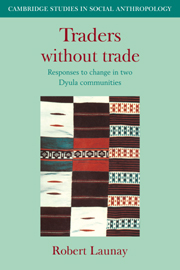Book contents
- Frontmatter
- Contents
- List of figures, maps and tables
- Preface
- 1 Introduction: the people and the problem
- PART I THE LEGACY OF THE PAST
- PART II RESPONSES TO CHANGE
- 6 The seeds of change
- 7 Occupation, migration and education
- 8 Being Dyula in the twentieth century
- 9 Dyula Islam: the new orthodoxy
- 10 Kinship in a changing world
- 11 Conclusions: Heraclitus' paradox
- Notes
- Bibliography
- Index
- Cambridge Studies in Social Anthropology
8 - Being Dyula in the twentieth century
Published online by Cambridge University Press: 15 October 2009
- Frontmatter
- Contents
- List of figures, maps and tables
- Preface
- 1 Introduction: the people and the problem
- PART I THE LEGACY OF THE PAST
- PART II RESPONSES TO CHANGE
- 6 The seeds of change
- 7 Occupation, migration and education
- 8 Being Dyula in the twentieth century
- 9 Dyula Islam: the new orthodoxy
- 10 Kinship in a changing world
- 11 Conclusions: Heraclitus' paradox
- Notes
- Bibliography
- Index
- Cambridge Studies in Social Anthropology
Summary
What does it mean in Ivory Coast nowadays to call oneself, or someone else, ‘Dyula’? In the first place, the original meaning of the term – ‘trader’ – has not lapsed. Nevertheless, the use of the term as an ethnic category label has spread far beyond the confines of the area where Manding-speakers lived as minorities before the colonial period. Precisely because of its newfound currency, the label has taken on somewhat different meanings for different people in different places. The shades of meaning which the term ‘Dyula’ can assume are not the same in Korhogo, in Kadioha or in the towns of the south.
Only in Kadioha has usage remained fairly straightforward. Almost the entire population of the village calls itself ‘Dyula’. Aside from the families of one forest ranger, a few primary school teachers and – for a while – an anthropologist, everyone in the village descends from those Manding-speakers who came to settle there in the nineteenth century and, in many cases, before. This situation is by no means unique to Kadioha; numbers of nearby Dyula villages are virtual replicas of Kadioha on a smaller scale. But the fact that the term ‘Dyula’ in Kadioha seems so unambiguous is also a product of the cultural conservatism of Kadioha's non-Dyula neighbors, the Senufo.
- Type
- Chapter
- Information
- Traders Without TradeResponses to Change in Two Dyula Communities, pp. 106 - 122Publisher: Cambridge University PressPrint publication year: 1982



